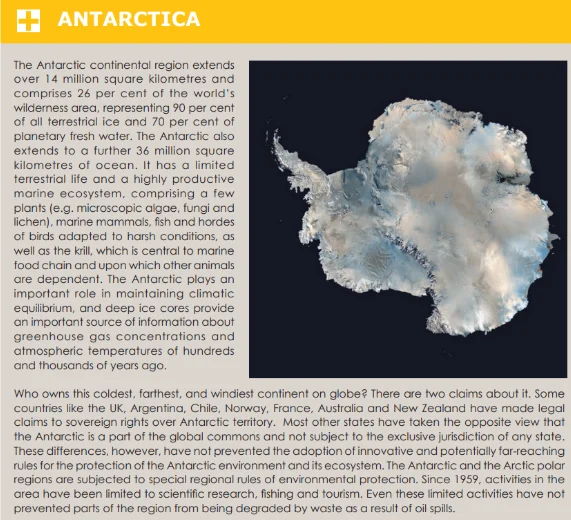![]() 23 Jul 2024
23 Jul 2024
Throughout the world, cultivable areas are barely expanding anymore, and a substantial portion of existing agricultural land is losing fertility. Grasslands have been overgrazed and fisheries overharvested. Water bodies have suffered extensive depletion and pollution, severely restricting food production.
About Statistics
According to the Human Development Report 2016 of the United Nations Development Programme, 663 million people in developing countries have no access to safe water and 2.4 billion have no access to sanitation, resulting in the death of more than three million children every year.

United Nations Conference on Environment and Development held in Rio de Janeiro, Brazil, in June 1992. This was also called Earth Summit. The summit was attended by 170 states, thousands of NGOs, and many multinational corporations.
Local Commons: ‘Commons’ are those resources that are not owned by anyone but rather shared by a community. This could be a ‘common room’, a ‘community center’, a park or a river.

Equal Responsibility for All: The developed countries of North want to discuss environmental issues as it stands now and want everyone to be equally responsible for ecological conservation.
Common property represents common property for the group. It represents common property for a group but with a rule that members of a group have both rights and duties concerning nature, and levels of use of a given resource.
| Must Read | |
| Current Affairs | Editorial Analysis |
| Upsc Notes | Upsc Blogs |
| NCERT Notes | Free Main Answer Writing |
Global challenges like agricultural land degradation, fisheries depletion, and water pollution necessitate immediate sustainable solutions. International agreements such as the Rio Summit and Kyoto Protocol highlight the importance of equitable responsibility in managing global commons. Balancing economic growth with ecological stewardship remains pivotal in securing a sustainable future amid increasing global pressures.
| Related Articles | |
| AGRICULTURAL DEVELOPMENT | ENVIRONMENTAL POLLUTION |
| ENVIRONMENT | CLIMATE CHANGE |
<div class="new-fform">
</div>